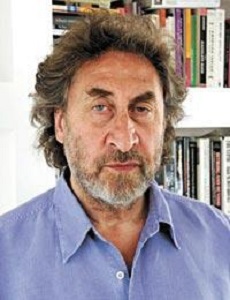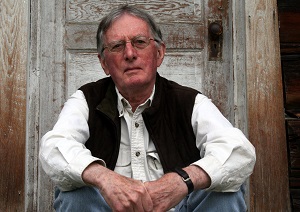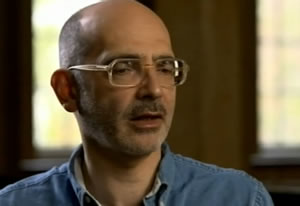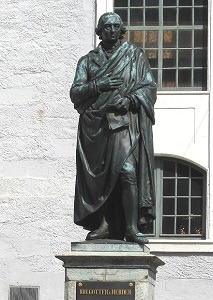De Engelse schrijver Martin Amis werd geboren op 25 augustus 1949 in Cardiff, South Wales. Zie ook alle tags voor Martin Amis op dit blog en ook mijn blog van 25 augustus 2010.
Uit: Denton’s Death
“Suddenly Denton realized that there would be three of them, that they would come after dark, that their leader would have his own key, and that they would be calm and deliberate, confident that they had all the time they needed to do what had to be done. He knew that they would be courtly, deferential, urbane – whatever state he happened to be in when they arrived – and that he would be allowed to make himself comfortable; perhaps he would even be offered a last cigarette. He never seriously doubted that he would warm to and admire all three at once, and wish only that he could have been their friend. He knew that they used a machine. As if prompted by some special hindsight, Denton thought often and poignantly about the moment when the leader would consent to take his hand as the machine began to work. He knew that they were out there already, seeing people, making telephone calls; and he knew that they must be very expensive.
At first, he took a lively, even rather self-important interest in the question of who had hired the men and their machine. Who would bother to do this to him? There was his brother, a huge exhausted man whom Denton had never liked or disliked or felt close to or threatened by in any way: they had quarreled recently over the allotment of their dead mothers goods, and Denton had in fact managed to secure a few worthless extras at his brothers expense; but this was just one more reason why his brother could never afford to do this to him. There was a man at the office whose life Denton had probably ruined: having bullied his friend into assisting him with a routine office theft, Denton told all to his superiors, claiming that he had used duplicity merely to test his colleague (Denton’s firm not only dismissed the man — they also, to Denton’s mild alarm, successfully prosecuted him for fraud); but someone whose life you could ruin so easily wouldn’t have the determination to do this to him.”

Martin Amis (Cardiff, 25 augustus 1949)
De Britse schrijver Howard Jacobson werd geboren op 25 augustus 1942 in Manchester. Zie ook alle tags voor Howard Jacobson op dit blog.
Uit: J
“Mornings weren’t good for either of them.“Here we go again,” Ailinn Solomons said to herself.She swung her legs out of the bed and looked at her feet. Even before Kevern’s insult she had disliked them. The broad insteps. The squat scarab toes, more like thumbs, each the same length as the others. She would have liked Pan pipes toes, beautifully graduated, musical, such as a Sylvan god might have put his lips to. She slid them into slippers and then slid them out again. The slippers made them look, if anything, worse. Hausfrau feet. The same old graceless feet, carrying her through the same old graceless life. No wonder, she caught herself thinking . . . but couldn’t finish. No wonder what?In reality there wasn’t much that was “same old” about her life, other than the habit of thinking there was. By any objective measure—and she could see objectivity, just out of reach—she was living adventurously. She had recently moved into a new house. In the company of a new friend. In a new village. For the move she had bought herself new clothes. New sunglasses. A new bag. New nail polish. Even her slippers were new. The house, though new to her, was not new to itself. It felt skulkingly ecclesiastical, which Ailinn had reasons of her own to dislike, as though a disreputable abbé or persecuted priest—a pastor too austere for his congregation or a padre too fleshly for his—had gone to ground there and finally forgotten what he was hiding from. It had stood stonily in its own damp in a dripping valley, smelling of wild garlic and wet gorse, for centuries. Neither the light of hope nor the light of disillusionment made it through its small, low windows, so deep into the valley. It deferred expectation—was the best you could say of it. Whoever had lived here before her, they had been, like the vegetation, neither happy nor unhappy. But though she shrank from its associations, it was still an improvement on the square slab of speckled concrete she had latterly grown up in, with its view that was no view of a silted estuary—the dull northern tide trickling in from nowhere on the way to nowhere—and the company of her frayed-tempered parents who weren’t really her parents at all.”

Howard Jacobson (Manchester, 25 augustus 1942)
De Amerikaanse dichter Charles Wright werd geboren op 25 augustus 1935 in Pickwick Dam, Tennessee. Zie ook alle tags voor Charles Wright op dit blog en ook mijn blog van 25 augustus 2010.
Road Warriors
My traveling clothes light up the noon.
I’ve been on my way for a long time
back to the past,
That irreconcilable city.
Everyone wants to join me, it seems, and I let them.
Roadside flowers drive me to distraction,
dragonflies
Hover like lapus lazuli, there, just out of reach.
Narrow road, wide road, all of us on it, unhappy,
Unsettled, seven yards short of immortality
And a yard short of not long to live.
Better to sit down in the tall grass
and watch the clouds,
To lift our faces up to the sky,
Considering—for most of us—our lives have been a constant mistake.
Addendum
Under the stone the lizard breathes,
His tongue 3 semaphore
In the blinking darkness;
Deep in the ribs of the oak’s cage
The owl, like a new moon, appears;
Poised at the roof of the river’s bed
The fish, thinking to rise, resists,
Fearing this gulp will be endless…
——-
Neither the flickering from the stone,
Nor the owl’s eye,
Nor the rainbow along the fish’s side
Will show the way.
But there, where the fire ripens
(Where the fire is ripening like a spring),
The path will open, the Angel beckon,
And we will follow. For light is all.

Charles Wright (Pickwick Dam, 25 augustus 1935)
De Duitse schrijver Maxim Biller werd geboren op 25 augustus 1960 in Praag. Zie ook alle tags voor Maxim Biller op dit blog en ook mijn blog van 25 augustus 2010.
Uit:Im Kopf von Bruno Schulz
»Sehrverehrter,hochgeschätzter, lieberherr Thomas Mann«, schrieb an einem überraschend warmen herbsttag im November 1938 ein kleiner, dünner, ernster Mann langsam und vorsichtig in sein Notizbuch – und strich den Satz sofort wieder durch. Er erhob sich von dem viel zu niedrigen, leise quietschenden Drehstuhl, auf dem er seit dem frühen Nachmittag an dem ebenfalls zu niedrigen Schreibtisch aus dem alten Büro seines vaters gesessen hatte, erstreckte, wie bei der Morgengymnastik, die Arme ein paarmal nach oben und zur Seite und blickte zwei, drei Minuten lang zu dem schmalen, verschmutzten Oberlicht hinauf, vor dem immer wieder Schuhe und Beine, Schirmspitzen und Rocksäume der auf der Florianskastraße vorbeigehenden Passanten auftauchten. Dann setzte er sich wieder hin und begann noch mal.
»Sehr geehrter herr!«, schrieb er. »Ich weiß, dass Sie täglich viele Briefe bekommen und wahrscheinlich mehr Zeit damit verbringen, sie zu beantworten, als mit dem Schreiben Ihrer wunderbaren, weltberühmten Romane. Ich kann mir vorstellen, was das bedeutet! Ich selbst muss sechsunddreißig Stunden in der Woche meinen lieben, aber völlig unbegabten Jungen das Zeichnen beibringen, und wenn ich am Ende desTages das Jagiełło-Gymnasium, an dem ich unterrichte, müde verlasse– «Er brach ab, stand wieder auf, und dabei stieß er mit dem linken Knie gegen den Tisch.Statt aber, sowie es jeder andere getan hätte,das angeschlagene Knie zureiben oder leise schimpfend durch den kleinen Kellerraumzu springen, hielt er seinen Kopf mit beiden händen fest – es war ein sehr großer, fast dreieckiger, hübscher Kopf, der von Weitem an die Papierdrachen erinnerte, die seine Schüler seit den ersten windigen Septembertagen im Steinbruch von Koszmarsko steigen ließen –, und kurzdarauf ließ er den Kopf mit einer einzigen heftigen Bewegung los, als ob er so seinen Gedanken raushelfen könnte.“

Maxim Biller (Praag, 25 augustus 1960)
De Engelse schrijver Frederick Forsyth werd geboren in Ashford, Kent, op 25 augustus 1938. Zie ook alle tags voor Frederick Forsyth op dit blog en ook mijn blog van 25 augustus 2010.
Uit: The Day of the Jackal
“Will you assassinate De Gaulle?’ asked Rodin at last. The voice was quiet but the question filled the room. The Englishman’s glance came back to him and the eyes were blank again.
‘Yes, but it will cost a lot of money.’
‘How much?’ asked Montclair.
‘You must understand this is a once-in-a-lifetime job. The man who does it will never work again. The chances of remaining not only uncaught but undiscovered are very small. One must make enough for this one job both to be able to live well for the rest of one’s days and to acquire protection against the revenge of the Gaullists . . .’
‘When we have France,’ said Casson, ‘there will be no shortage . . .’
‘Cash,’ said the Englishman. ‘Half in advance and half on completion.’
‘How much?’ asked Rodin.
‘Half a million.’
Rodin glanced at Montclair, who grimaced. ‘That’s a lot of money, half a million new francs . . .’
‘Dollars,’ said the Englishman.
‘Half a million dollars?’ shouted Montclair, rising from his seat. ‘You are crazy?’
‘No,’ said the Englishman calmly, ‘but I am the best, and therefore the most expensive.’
‘We could certainly get cheaper estimates,’ sneered Casson.
‘Yes,’ said the blond without emotion, ‘you would get men cheaper, and you would find they took your fifty per cent deposit and vanished, or made excuses later as to why it could not be done. When you employ the best you pay. Half a million dollars is the price. Considering you expect to get France itself, you esteem your country very cheap.’
Frederick Forsyth (Ashford, 25 augustus 1938)
De Faeröerse schrijver Jógvan Isaksen werd geboren op 25 augustus 1950 in 25/08/1950 in Tórshavn, Faröer Eilanden. Zie ook alle tags voor Jógvan Isaksen op dit blog en ook mijn blog van 25 augustus 2010.
Uit: Option Färöer (Vertaald door Christel Hildebrandt)
„Bei dem Lärm konnte ein höfliches Klopfen unmöglich zu hören sein. Ich klopfte noch einmal an. Dieses Mal mit allen Kräften. Das Resultat war das gleiche.
Aber jetzt konnte ich hören, dass Mick Jagger seinen Refrain zum letzten Mal sang:
I can’t get no, I can’t get no
I can’t get no satisfaction
No satisfaction, no satisfaction
No satisfaction
Als die Musik aufhörte, waren Lachen und Kreischen zu hören.
Ich klopfte zum dritten Mal.
Einen Augenblick später wurde die Tür geöffnet und ein Mann mit dem Umfang einer Tonne öffnete die Tür.
»Was willst du?«, donnerte die Tonne.
»Ich soll von Heindrik grüßen«, sagte ich kleinlaut.
Der Dicke war in meinem Alter – so um die vierzig – und hatte blonde Locken und einen herunterhängenden, rötlichen Schnurrbart. Knallgelbe Hosenträger, dekoriert mit grünen Meerjungfrauen, hielten seine riesige graue Hose direkt unter dem Brustkasten an Ort und Stelle. Darunter trug er ein helles Hemd mit himmelblauen Blumen.“
Jógvan Isaksen (Tórshavn, 25. augustus 1950)
De Duitse dichter, schrijver, theoloog en cultuur-filosoof Johann Gottfried von Herder werd geboren in Mohrungen op 25 augustus 1744. Zie ook alle tags voor Gottfried von Herder op dit blog en ook mijn blog van 25 augustus 2010.
Weisen mit der Wissenschaft…
Ihr Weisen mit der Wissenschaft,
die Welten zu bewegen,
gebt einem matten Herzen Kraft,
ein Fünkchen neu Vermögen,
ach, einen Tropfen Lebenssaft,
sich jugendneu zu regen.
Ich laß euch eure Wissenschaft,
die Welten zu bewegen.
Warum denn…
Warum denn währt des Lebens Glück
Nur einen Augenblick?
Die zarteste der Freuden
Stirbt wie ein Schmetterling
Der hangend an der Blume
Verging, verging.
So schlage fröhlich…
So schlage fröhlich, denn, mein Herz, du schlägst
Im Quell der Lieb´und dieser schlägt in dir!
Auf, atme frei, mein Geist, du atmest nicht
Im Erdendunst, du atmest Äther – Gott!
Und schiffe froh, mein Schiff des Lebens! Sturm
Und Welle machen dir nichts; dein Hafen ist,
Dein Anker, selbst dein Schiffbruch ist Gott!

Johann Gottfried von Herder (25 augustus 1744 – 18 december 1803)
Standbeeld bij de Stadtkirche St. Peter & Paul (Herderkirche), Weimar
Zie voor nog meerschrijvers van de 25e augustus ook mijn blog van 25 augustus 2014 en ook mijn blog van 25 augustus 2013 deel 2.
